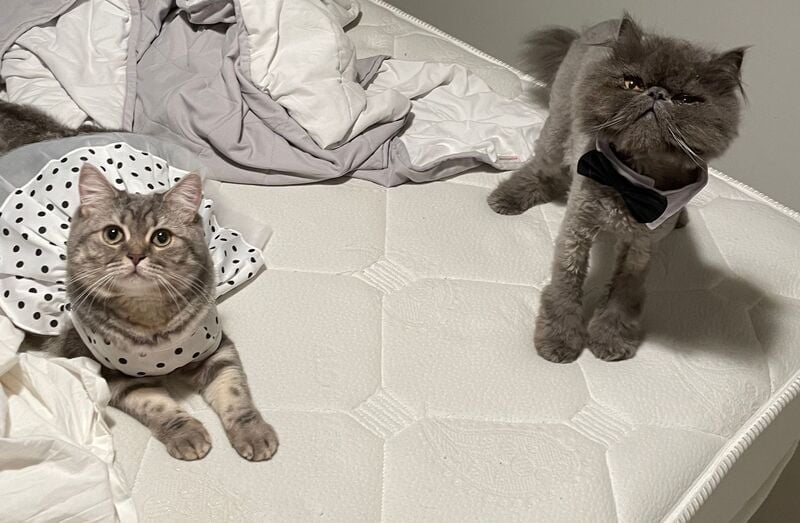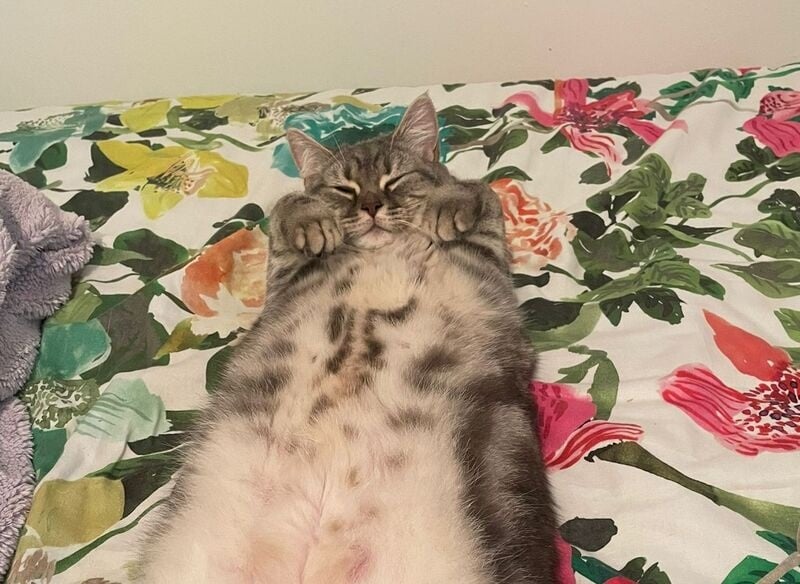Is It A Cat Fact or Fiction?
 Image by Reddit
Image by Reddit
Sometimes cats are hard to read. A cat’s demeanor often doesn’t disclose much, therefore knowing what your cat is feeling or thinking is hard to decipher. This makes a cat’s needs or wants very hard to figure out for us humans, not to mention a big challenge for cat owners alike. Since cats remain so mysterious, they come with their own slew of myths. Don’t worry though, we are here to help unravel all the misinformation out there. Is what you have been told to believe, a true cat fact, or is it indeed fiction? You are about to find out!
Fact or Fiction: Cats Always Land on Their Feet
Although cats are very agile and this can be sometimes true they do not land on their feet 100% of the time. If they land the wrong way they too are susceptible to serious injury. In contrast to what many people believe, cats are more prone to injury from low heights as opposed to high ones since they have less response time to alter their position accordingly. In order to keep your cat safe, it is important to be mindful of the window screens in your home and routinely check them for holes and other damages. Additionally, keep your countertops and shelves in locations that don’t tempt your cat to pine for their viewpoint advantage.
Fact or Fiction: It’s Better for Female Felines to Give Birth, then Be Sprayed
Quite to the contrary, it is better to spray your cat before they are mothers. Spraying your cat, in general, is a big decision but doing so after they have already become a mother since there are extreme cases of the overpopulation of cats, especially in the US. Doing this beforehand helps prevent the neglect of cats and puts fewer animals at risk.
Fact or Fiction: It Is Impossible to Train Your Cat
When you think of training your pets, it is safe to say that there are many other animals that come to mind before cats, but your cats can indeed be trained. Your cat can be trained to do certain tasks or tricks and this can even improve your cat and owner's relationship with them. When attempting to train your cat it is essential to introduce positive reinforcement as well as to not force your cat to do something they don’t want to do as it could have opposite effects. If you are not sure how to go about this, your veterinarian usually has some great tips so it can be an excellent place to start.
Fact or Fiction: Your Cat Can Eat Chocolate on Occasion
Under no circumstances should you give your cat chocolate! Just like for dogs, chocolate can be extremely toxic for your cat. Chemicals such as theobromine, which is considered an alkaloid, an organic base that contains nitrogen, can make your furry friend extremely sick. Dark chocolate contains even more of this type of base making it the deadliest kind of chocolate of them all. Additionally, dairy is very unhealthy for your cat and can create digestive problems. The best food for your cat to eat is meat. Meat provides the protein that your cat needs to maintain strong vision, and a healthy heart and reproductive system.
Fact or Fiction: Cat Staying Indoors Prevents Diseases
Even if your cat loves staying indoors they are still just as susceptible to diseases as much as cats that love to roam around outside. Cat’s are just as prone to diseases no matter if they are indoors or outdoors. Cats indoors are just as likely to be exposed to gems, especially since their owners can track the gems they have collected from the outside as it sticks to your clothes. Cats can get just as sick from insects that carry disease. In order to minimize the risk of diseases for your cat, it is recommended to leave your shoes at the door once you have returned home.
Fact or Fiction: Stealing Your Baby’s Breathe
Is your baby really at risk from your cat? The short answer is no. This belief is undoubtedly a popular myth although some precautions may be needed to ensure the safety of both your baby and your cat. Many cats enjoy snuggling and pressing up against you, so for this reason and their tendency to curl up around your neck it is crucial for your baby’s safety to not fall asleep with your family’s cat until your child is slightly older to prevent accidents. If you’re not sure what age is right for your children to sleep with their cat it is recommended to consult a professional such as your veterinarian.
Fact or Fiction: There is No Need to Brush Your Cat’s Teeth
It is essential to maintain regular hygiene maintenance for your cat, this includes brushing their teeth routinely. This practice minimizes oral diseases that can affect your cat’s health not to mention maintains freshness and comfort for all who are around your cat.
Fact or Fiction: Cat’s Have Nine Lives
Sadly no, your cat does not have nine lives. This is why it is important to make sure your cat stays happy and healthy during the life they currently lead. Maintaining a strong relationship with your veterinarian is one of many ways to make sure your cat lives their best life. Your cat relies on you to maintain their routine checkups, their vaccinations, and undergo oral examinations. Contrary to what you may have heard cats need to be vaccinated regularly and can carry rabies so your cat’s checkups are what have the ability to keep your cat from contracting infections.
Fact or Fiction: Table Scraps Are Good For Your Cat
Table scraps are not ideal for your cat, like humans they need a balanced and consistent diet. Cats thrive on carefully calculated nutrition which needs to correspond and evolve in accordance with their exact needs and stages of life. If you are giving your cat extra food from under the table this can have the opposite effect on your cat's help. For this reason, it is important to be mindful of your cats eating habits and stay consistent.
Fact or Fiction: Tail Flicking Is a Sign of a Happy Cat
Determining how happy your cat is will always remain a little bit of a mystery. Normally cats move their tails to indicate deep thought or if they are agitated but it is never an exact indication. A cat’s body language is extremely nuanced like humans so it is important to evaluate not only their body language but all contexts of the situation as well as their tones. Being aware of these subtle markers will help you understand your cat better as time goes on.
Fact or Fiction: Your Cat Doesn’t Need Exercise
Exercise is always beneficial, and your cat is no exception. Cat’s thrive on both mental and physical stimulation. Although it is recommended to keep your cat indoors, it doesn’t mean that you can’t offer them regular exercise to keep them active. There are countless toys and gadgets to buy which promote a healthy active lifestyle despite being indoors. Your local pet store is sure to have lots of items for you to choose from and your cat will without a doubt appreciate you for it.
Fact or Fiction: Pregnant Woman Should Avoid Cats
People have said that pregnant women should avoid cat interactions in order to minimize risk of diseases and infections such as Toxoplasmosis, a type of parasite, but this is a misconception among many. This type of parasite can spread via your cat’s litter box so as long as the pregnant woman avoids such contact then there is no risk at all.
Fact or Fiction: If a Cat has No Whiskers, They Lose Balance
This myth is a funny one since whiskers are used as sensory feelers to interact with their environment but do not have anything to do with a cat’s balance. A cat’s whiskers can be a strong tell regarding their mood if you pay attention to where they are positioned. A cat’s whiskers are deeply embedded in their skin so removing them is extremely painful because of the abundance of nerve endings located there. This being the case your should not under any circumstances cut or pull them, this could anger your cat severely as well as be harmful.
Fact or Fiction: Cat’s Love Milk
Like for most animals, milk can be quite horrible for your cat. Milk can lead to severe digestion problems as well as diarrhea so it is best to avoid it in your cat’s diet. It is important to maintain a diet that is tailored to the needs of your cat.
Fact or Fiction: A Cat Easting Grass Indicates Sickness
This theory has yet to be proven by professionals and therefore it is not exact. Although many studies show that it could be a high possibly some just simply enjoy eating grass. If you do suspect a health issue it is best to talk to a professional right away instead of trying to figure it out on your own.
Fact or Fiction: Putting Garlic in Cat Food Helps Avoid Worms
Many people enjoy garlic in their food, but this is not the case for your cat. Putting garlic in cat food is extremely harmful to your cat as it can cause severe side effects such as damaging your cat’s red blood cells, causing anemia. It is best to avoid such additions in your cat’s food as it ultimately poisons your cat.
Now that you can differentiate between fact and fiction, you are on your way to becoming an even better and more responsible cat owner. No matter what it is essential to ask for help when you need it and listen to your cat’s needs by observing and maintaining your cat’s routine.
Related posts

Is It A Cat Fact or Fiction?
Sometimes cats are hard to read. A cat's demeanor often doesn't disclose much, therefore knowing what your cat is feeling or thinking is hard to decipher. This makes a cat's needs or wants very hard t

Why Do Women Typically Believe in Astrology More Than Men?
As far as historians have studied women are stronger believers in astrology than men. From ancient to modern times, there is a long list of proof. Today, you only need to flip through the leading wome


